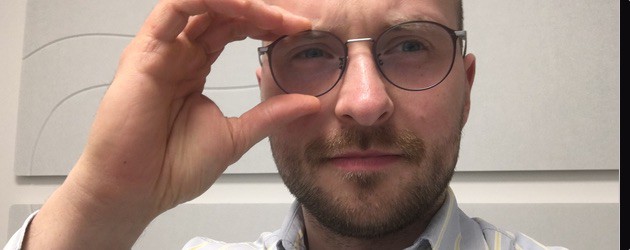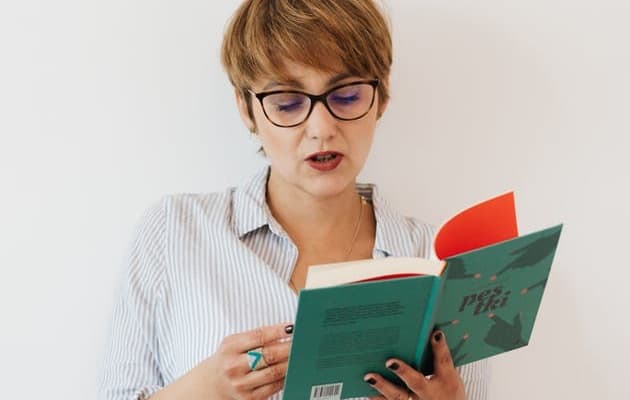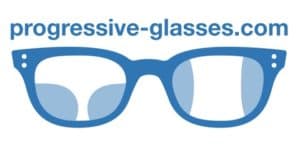The natural process of aging is inevitable for everyone. Although it is a process ripe with wonderful changes, some of them can be undesirable. As people age, their eyesight deteriorates the same as their muscular strength diminishes. It is largely unavoidable, but that does not mean that everyone will be affected the same.
Most people will need reading glasses after 40, but not everyone will. The decision is multifaceted and evaluated on a case by case basis. The best option is to visit your Optometrist for verification.
If you are wondering why you might need reading glasses, then continue reading. The article will analyze the common vision issues common in older adults, and it will start by detailing why you might need reading glasses after 40.

Does Everyone over 40 Need Glasses?
If you are asking yourself this question, you are likely over 40 and experiencing some type of deterioration of eyesight. It is okay, as having to buy reading glasses is not the worst thing. In fact, it can prevent a lot of issues before the problem escalates. You may need reading glasses if you experience any of the following symptoms:
- Problems Focusing on Objects Up Close: If you cannot focus on objects up close, this is a sign you should consider reading glasses.
- Pain When Reading: Any sort of discomfort during or following reading implies your eyes being stressed.
- Sudden Headaches When Focusing: Focusing can cause headaches, especially if your eyes have aged. You could need medicinal lenses.
- White Spots: White spots in your vision can be a symbol of you needing reading glasses. It could also allude to a more serious ocular condition.
- Blurriness: Blurred vision, especially up close, is often one of the first signs of you needing reading glasses.
The symptoms listed here are not all-inclusive, but they do cover the most common signs. They also vary depending on the individual. In fact, there are plenty of other factors that affect vision with age.
Factors That Affect Vision with Age
As people age, their eyes age too. People’s eyes begin to become less effective and work slower. But, there are many factors that inhibit or increase the aging of the eyes. These factors can be both environmental and genetic.
In addition to the eyes becoming less effective, they begin to undergo interesting changes. These changes can include:
- Warped Vision: The field of vision can begin to change as the eyes change.
- Susceptible to Cataracts: With the natural changes in the lenses in your they get cloudy over time.
- Burning Eyes: Dryness can cause ocular irritation resulting in burning.
These changes are all normal. As a person’s eyes age, they become increasingly tired and require careful attention, which brings the topic to the importance of ocular health and the discussion of environmental factors that can affect vision.
Environmental Factors That Affect Vision
Although not everyone will need reading glasses after 40, some inevitably will, mainly due to a culmination of environmental factors that have resulted in eye strain throughout the years. Eyes function the same as other organs, the same as the lungs of a smoker deteriorate over time from increased use.
If you spend a considerable amount of time watching television uninterrupted or staring at a screen in general, you are accelerating the damage to your eyes. Moreover, if this has already been done for most of your life, you are likely already dealing with some effects. Below is a list of more environmental factors:
- Water Damage: If you routinely swim without goggles, the mix of chlorine and other chemicals will result in eye strain.
- Sun Damage: Ultraviolet radiation (UV) does not just do damage to the skin. It also does damage to the eyes. Next time you are out, take your favorite pair of sunglasses.
- Blue Light: This type of light contributes directly to eye strain and dry eyes. Most blue light is shining down from the sun. Displays have just a fraction of the intensity compared to the sun.
- Lack of Nutrients: An ill-balanced diet can lead to eye dehydration.
- Eye Rubbing: Blood vessels can rupture when you rub your eyes, resulting in eye strain.
If you, like most people, have been affected by any combination of these environmental factors and happen to be over 40, you may need reading glasses. But the keyword here is “may.” Genetic factors are also at play.
Genetic Factors That Influence Eyesight
Some eye conditions are genetic and simply cannot be avoided. They can, however, be managed. Below is a list of the more common ocular genetic issues that arise with age:
- Farsightedness: Blurred vision near when higher even far too
- Nearsightedness: Blurred vision far
- Dry Eyes: Decreased tear production
Now, it is also possible that you suffer from these conditions without a genetic cause. They can also be environmental. If you are unsure, visit your optometrist.
There are a few more things that may help you decide on getting reading glasses, and these are ocular diseases that require them. These types of diseases or conditions are all treatable. And, while diving into a further analysis of the aging of the eyes, you will be able to make a more informed decision going forward.

Ocular Aging
The complex aging process of the eyes is undoubtedly annoying, but it is a life change that most people will have to learn to embrace. Ocular aging largely affects the lens of the eye, a process responsible for fine-tuning an image for sight. It is similar to how a camera focuses in and out to enhance the clarity of a picture.
For example, the lens of the eye is in control of the following features:
- The focusing of light
- Directing images to the brain for processing
- Bending and stretching to help with sight
What Is So Important about the Lens?
The lens of the eye is sort of a shape-shifter. It bends and stretches, as stated above, to help bring an image to clarity. In addition, the lens works with other processes to refract light. Sometimes referred to as a “camera,” the lens is responsible for allowing people to see the world as they do right now.
As the eyes age, the ocular lens hardens, and it becomes harder for it to refract light the same way. This problem is directly responsible for the more common nearsightedness and farsightedness, as the lens cannot bend as fluidly. Here is a full list of the benefits of the lens:
- Provides for Better Visibility: By sorting light, the lens is responsible for visibility.
- Allows Us to Make Sense of What We See: The lens directs images to the brain for processing, allowing people to make sense of images.
- Handles Focusing: Due to its flexible nature, the lens can accommodate to focus near or far at will.
As you can see, the lens of the eye is crucially important. But this is not the only part of the eye that is directly affected by aging. The retina, too, changes with age. And this part is crucial in the decision of if you will need glasses or not.
What Is So Important about the Retina?
The retina is also known to be the organ where vision starts, and that is because, without it, the process of sight would not even begin. The retina lies in the back of the eye. It is a sensory membrane responsible for bringing vision into play by sending light to the visual centers in the brain.
It is a crucial job, and the retina’s job does not stop there. The retina is also responsible for allowing you to see color. The cones, color receptors, rods, motion/black, and white receptors are directed by the retina. Here is a full list of benefits of the retina:
- Provides Black and White Coloration: The rods operate in black and white to allow you to see.
- Provides Visual Acuity: The retina ensures that you have the maximum vision in less than favorable lighting.
- Gives Us Motion Detection: You can detect movement through peripheral vision with the retina.
Ocular aging can affect your retina as well.
Effects Of Aging On The Retina
There is an array of issues that can affect your retina as you age, resulting in the need for reading glasses to correct vision. Keep in mind that these can be treated with routine trips to your Optometrist, who will make the final decision on if you need reading glasses or not.
- The retina loses its ability to provide pristine visual acuity with age, resulting in the rods and cones of your eyes, losing their sensitivity. In short, this means that the vibrant colors you are so used to seeing will become dulled with age.
- It may also become more difficult to see in the dark as our rods lose sensitivity. Motion detection will become harder, and wandering in the dark may give you a headache.
If you are dealing with these already, you likely need reading glasses, and you may be dealing with a precursor to the following age-related ocular issues. When the retina is damaged for example by age-related macular degeneration in some cases special electronic devices are needed to provide you with the optimal magnification than normal reading glasses can not.
Presbyopia
Presbyopia, the most common age-related ocular defect, is known as the gradual loss of the elastic nature of the lens. It results, as stated above, in farsightedness. The defect is most common in people ages 40 through 65. In addition to nearsightedness, there are additional symptoms of Presbyopia:
- Headaches During Reading
- Dry Eyes
- Eyestrain
- Blurred Vision During Reading
Presbyopia is a normal part of aging. There is currently no way to reverse the effects of presbyopia, but it can be managed by prescription glasses, eye exercises, and eye drops.
Cataracts
Increasingly common with age, cataracts occur when proteins begin to cloud your lens. The issue prevents your lens from properly converting images. There are many different types of cataracts. If you have any of the following symptoms, you may have cataracts:
- Eye injuries: Previous ocular injuries could increase your susceptibility to cataracts.
- Age-Related Ocular Issues: The natural process of aging is number one in the possibility of cataracts, and susceptibility is increased if your eyes are already in bad shape.
- Environmental Causes: UV radiation can result in cataracts.
- Alcohol Use: The cessation of alcohol will help relieve oxidative stress, which can prevent cataracts.
- Genetics: Sometimes, genetics are instrumental in the development of cataracts.
Regardless of the reasoning, or the threat of ocular diseases, you can manage them by taking the proper precautions. Also, Cataracts are common in people who do not have a healthy diet. The lack of vitamins, such as Vitamin A or C, can result in your eyes not having the proper nutrients to function the best they can.
The Importance of Eye Care
The eyes are living, breathing organs that need to be taken care of as well. Eyes need exercise, rest, and more — the same as other organs. Factoring eye care into your daily routine will help you at any age.
On the other hand, people use their eyes often. Having a poor set of eyes can make your daily life much more difficult. Some diseases and age-related dilemmas can be avoided if caught in time.
Furthermore, if you are wondering if you need reading glasses after 40, taking these precautions might help you avoid that decision.
Fruits and Veggies
You might be surprised to learn that eating a combination of healthy fruits and vegetables can help to ensure the longevity of your eyes, even if you are over 40. Fruits and vegetables rich in antioxidants keep our cells healthy. Here is a list of some delicious ones you can include in your diet:
- Oranges: Rich in Vitamin C, oranges are the perfect fruit to provide your eyes with the nutrients they need to keep them healthy.
- Spinach: Spinach contains the powerful antioxidants of Lutein and Zeaxanthin. Both of these antioxidants give your eyes a boost of immunity.
- Grapefruit: Due to the high concentration of Vitamin A, grapefruit helps reduce the possibility of ocular disease.
- Sweet Potatoes: Containing Beta Carotene, sweet potatoes are responsible for helping your eyes stay lubricated.
- Grains: Zinc in grains helps your eyes against inflammation from light.
A balanced diet helps more than just your eyes. It is a great idea all the way around. In addition to a balanced diet, exercise is a holistic activity that does wonders for the body — including the eyes.
Exercise
Everyday exercise is wonderful for the eyes. Not only does it wake you up, but it gets the blood pumping, literally. That blood flows directly to the retina and optic nerve, providing them with the nutrients they need to function properly.
Moreover, exercising releases much-needed antioxidants to your eyes, healing them from any cellular damage or scarring. If physical activity is not your thing, you can also help your eyes by doing ocular exercises. They may not bring antioxidants to your eyes, but they can provide relief.
- Focus Shift: Focus shifting involves taking any prescription eyewear off and trying to focus your eyes on the nearest and furthest object you can. Try focusing on something like a book, then a random object in the distance.
- Figure Eight: In the distance, picture a giant figure eight. Now trace it, slowly. It is a great exercise for ocular flexibility.
- Object Focusing: Similar focus shifting, try focusing your eyes on an object for a while. Then refocus and do it again.
We have saved the best for last when it comes to the importance of ocular care.
Book an Appointment with Your Optometrist
It is common sense to say but needs to be repeated. Seeing your Optometrist is the best way to guarantee your ocular health. Only your doctor knows what is best for your eyes, and your Optometrist will help you with solutions to any dilemmas you have.
Moreover, if you do not want reading glasses but need them, your doctor may have additional solutions to the problem. It is completely dependent on your personalized visit.
Conclusion
So, you have wondered if everyone needs reading glasses after 40? Well, as you can see, it depends. Everyone’s eyes are different, and everyone’s lifestyle is unique to their own. No, everyone will not need reading glasses, but everyone does need to make sure they take care of their eyes.
